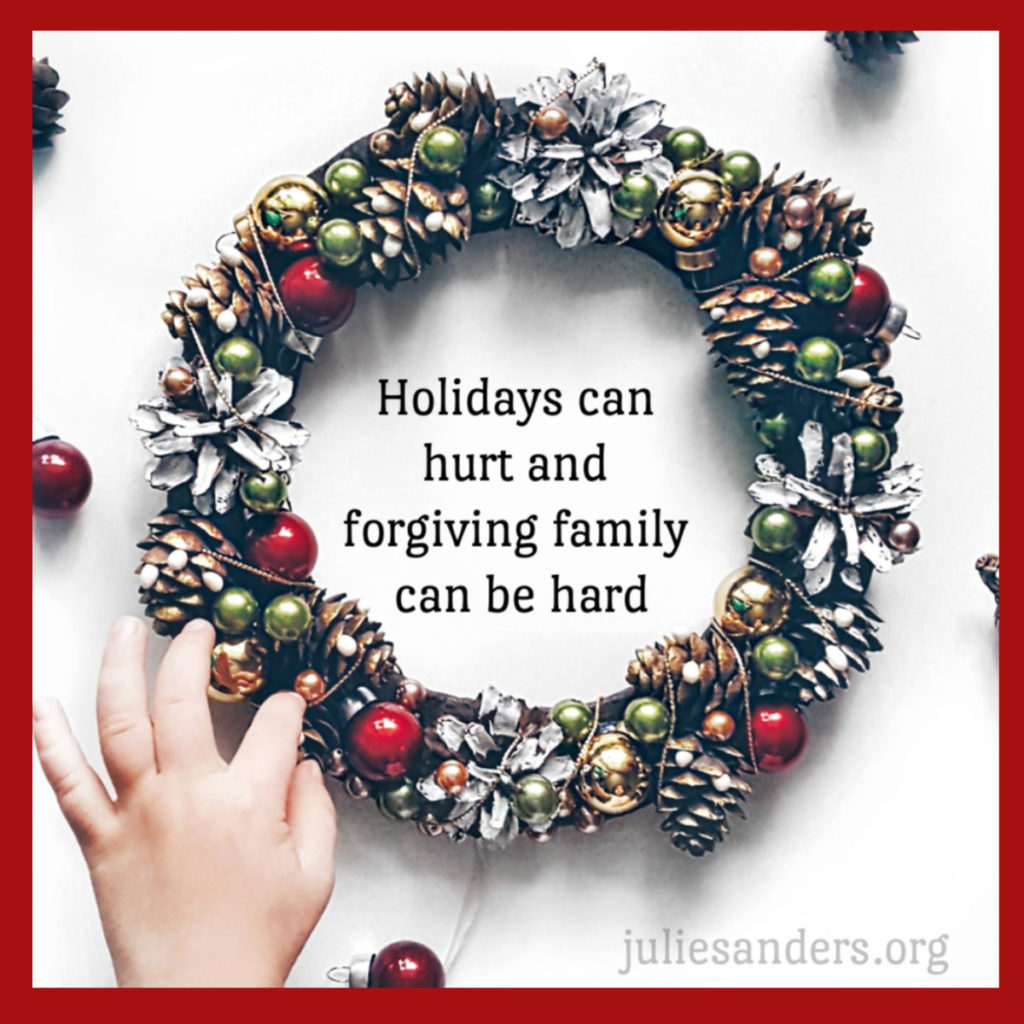Have you already been with family or friends? Did it hurt? It doesn’t take much to make a holiday hurtful. You don’t have to be family to injure each other; you can be friends. Triggers may come while planning the menu, agreeing on gifts, cleaning up dishes, asking about relationships, picking out a tree, putting on lights, or sharing an opinion. Every relationship has the potential for pain. Hurt isn’t necessarily intentional, but sometimes it is. On purpose or accidental, holidays can hurt and forgiving family can be hard.

How can we forgive during this season of giving when all we feel is disappointed? Forgiveness is at the core of who God is, so much that His Son Jesus acted (Ephesians 1:7) to make it possible for our wrong to be covered (1 John 1:9) by the gift of His life. He cares about His children forgiving family. Forgiveness is the force behind Christmas.
The forgiveness we experience makes it possible and worthwhile to forgive each other.
Make allowance for each other’s faults, and forgive anyone who offends you. Remember, the Lord forgave you, so you must forgive others. – Colossians 3:13 (NLT)
So what’s the right thing to do about the wrong things that hurt you this holiday season?
How to Start Forgiving Family
First, find the words and dump it.
No one advocates building a holiday meltdown. It’s important to acknowledge painful events and understand them so we identify them accurately. I find it helps to pray through what I felt, what I heard, what I saw, and what I conclude. In prayer, God sorts through my confusion and helps me see clearly.
Instead of claiming, “Aunt Sharon said my cooking should be served with an ‘Eat your own risk’ label,” maybe I should first admit to myself the size and intensity of what she really said. “Honey, I’m afraid I found a nut shell in Grandma’s salad. Maybe you were in a hurry?”
In an age when sarcasm is woven through late night skits, memes, podcasts, and comedies, we may not hear ourselves shift into telling ourselves or our listener about what happened as if we’re on the stage of Friends (The One With the Holiday Armadillo) or punching Jerry Seinfeld while celebrating Festivus. In reality, that’s not reality.
If I’m going to forgive family for holiday pain, I need to tell myself the truth. Find words to accurately describe what happened and how it felt; rehashing it to myself (and others) in a way that makes it bigger. “When Aunt Sharon found that shell, I was so embarrassed that Grandma’s recipe wasn’t right. I felt angry at Aunt Sharon for drawing attention to my mistake.”
Second, sift the words and share it.
Our first reaction is not always where we land. It can help to share with a trusted person that we experienced holiday hurt, but not until we sift the words. Again, prayer is a good place to do the work of sifting. Choose words carefully so they don’t enflame the event or draw someone else into the offense. The safest place to share is in prayer.
Sharing our hurt by naming the feeling and verbalizing our desire to forgive is a helpful way to invite support, encouragement, and accountability. Most details (and all of the judgment) can be left out. Select the best words to describe your pain and share it with someone who will help you dump it and move to restoration. If they’ll pray, even better.
Next, accept the words and forgive it.
Accepting the words requires that we admit to ourselves that we probably had a part in it, along with our imperfect friend or family members. Life is flawed like that. Even special occasions are not exempt of pain. Forgiveness begins when we acknowledge what happened and who participated, so we can remember Jesus has forgiven us more than all of it. Once we accept the flaw in our festive day (or season), we can follow the same path Jesus took that leads to forgiveness. If He did, we can. Because He did, we can.
Then, process the words and use it.
We don’t just dump it, share it, and forgive it. We learn from it. Not in a proud or cynical way, but with the humility from knowing life includes offenses. Some we commit and some we experience. Consider the experience you had and the loss, anger, or confusion it caused. Learn from it and use that understanding to change how you approach others, whether family or friend. Digest the disappointment and let it develop you.
When Jesus took on human flesh, lived a life on earth, and gave His life for the world, He made it possible for us to be treated with forgiveness. Since we’re forgiven so much, it only makes sense that forgiving family is worth a try when good times turn into hurtful holidays.


Julie, This is such a great and practical article. Thank you for sharing!!